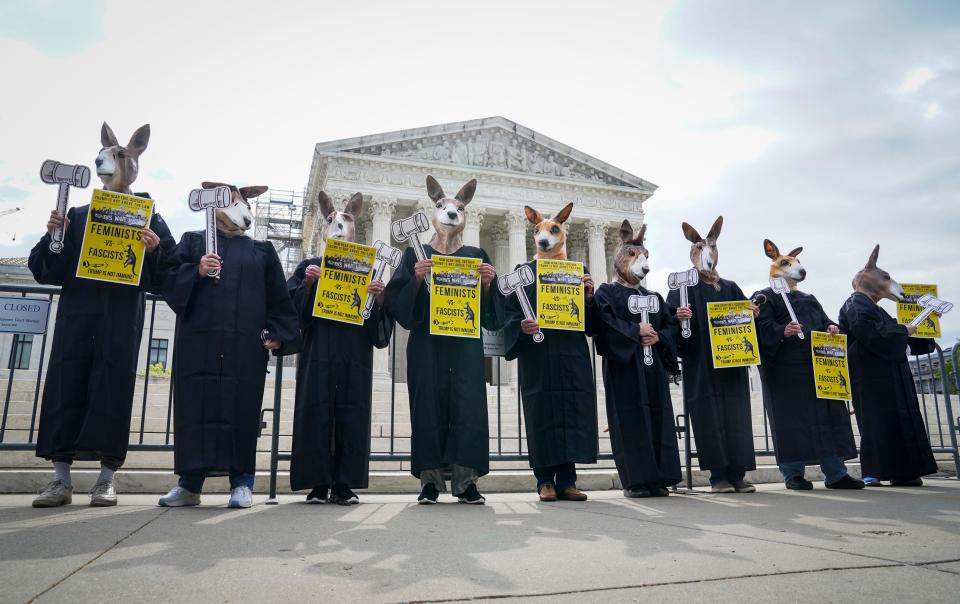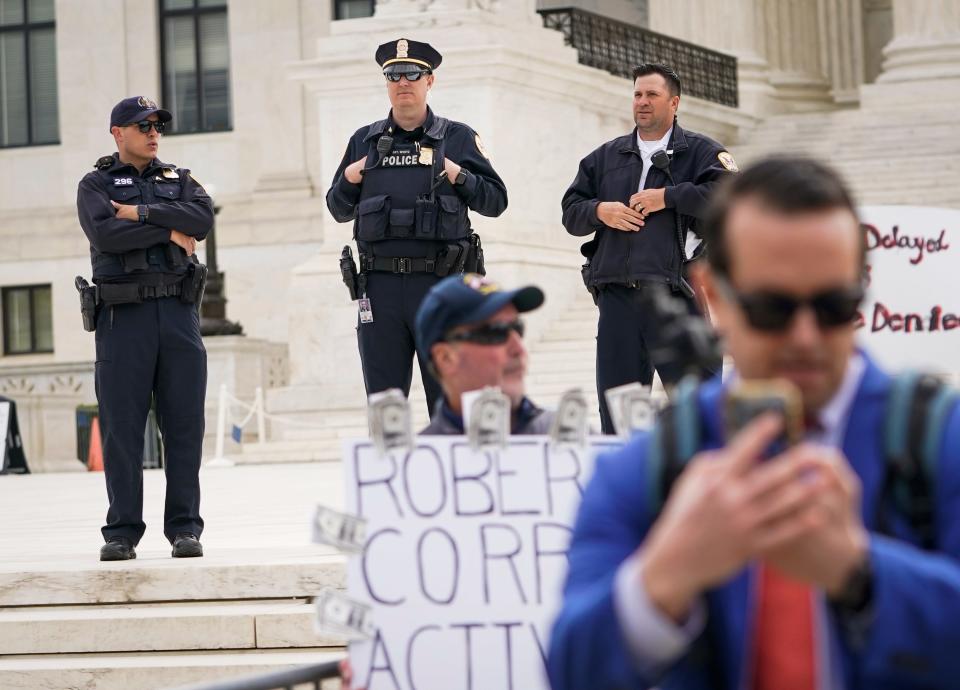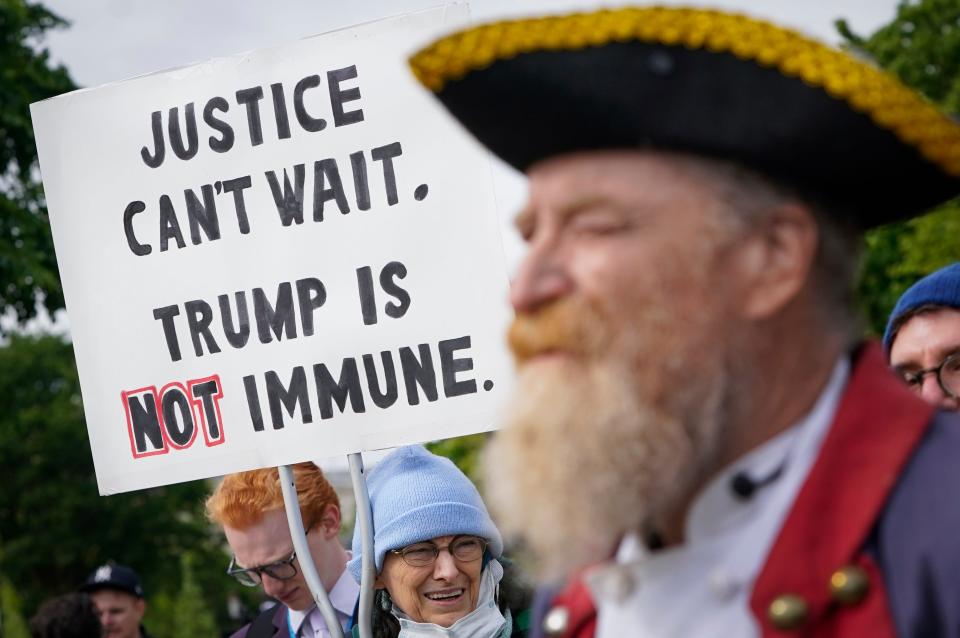'Rule for the ages': Takeaways from historic Supreme Court arguments in Trump immunity case
WASHINGTON ? The Supreme Court appeared inclined Thursday to reject former President Donald Trump’s historic claim that he’s immune from prosecution – but the justices could still limit the charges he faces and delay his trial on election interference charges.
The justices could decide that the lower courts need to investigate whether immunity applies to any of Trump’s actions before he can be tried.
That would likely make it impossible for a trial to be finished before voters decide in November whether to return Trump to the White House.
"Trump had much more success than many court watchers expected,” said John Yoo, a former Justice Department official under George W. Bush. “Only the three liberal justices seemed to reject the idea of immunity outright.”
Trump trial updates Latest news from Trump criminal trial, including cross-examination of David Pecker
If Trump becomes president, he could order the Justice Department to dismiss the charges against him.
Here are the takeaways from the court's more than two-and-a-half hours of debate.
Trump's lawyer agrees some alleged acts can be prosecuted
It was a conservative justice – and one of Trump’s three nominees on the court – who looked for ways for Trump’s trial to proceed.
Justice Amy Coney Barrett first got Trump’s attorney to agree that there’s no immunity for a president’s private actions, as opposed to those taken in his official capacity as president.
Reading from the indictment, Barrett then asked John Sauer if some of the charges against Trump involved only private conduct.
What about conspiring with a private attorney to file false allegations or to using another attorney to spread claims about election fraud he knew were false,” she asked.
Sauer disputed the characterization of the allegations but said that, if true, they cover private actions.
When it was the Justice Department’s turn at the bench, Barrett asked Michael Dreeben about the possibility of the special counsel trying Trump just on the charges that undisputable include only private actions.
“The special counsel has expressed some concern for speed and wanting to move forward,” she said. “Is another option for the special counsel to just proceed based on the private conduct and drop the official conduct?”
Dreeben said the two are interrelated because the steps Trump took as president made his other actions more likely to succeed.
“We would like to present that as an integrated picture to the jury so that it sees the sequence and the gravity of the conduct and why each step occurred,” he said.

Debate over how quickly trial could proceed
Since even Trump’s attorney agreed that the former president is not immune from prosecution from some of the charges, the big question is whether the Supreme Court will direct the lower court to take additional action before seating a jury. That will determine whether a trial can begin before the November election.
Chief Justice John Roberts asked Sauer what should happen if the Supreme Court latches on to his concession that private acts can be prosecuted.
Sauer said the district court should have to determine which charges meet that definition before Trump can be tried.
Justice Sonya Sotomayor backed the Justice Department’s position that the district court judge can decide those issues as the trial unfolds.
"So I'm not sure that I understand why your problems couldn't be taken care of at trial with an instruction if we believe ? if the court were to find ? I'm not even sure how they could ? but if it were to find that some publicacts could not be the basis of criminal liability," she told Sauer.
Rick Hasen, an election law expert at the UCLA School of Law, predicts the court’s decision will be closer the government's position than it will be to Trump’s sweeping immunity argument. But the justices are likely to find different ways of getting there, which means the opinion will take longer to write, and a majority will want further proceedings.
“The bottom line is that Trump is likely to get what he wants – a further delay of this election subversion case, maybe pushing it to after the election,” Hasen wrote.
Justices revive debate about presidents killing political opponents with immunity
When Sauer argued for Trump at the D.C. Circuit Court of Appeals, Judge Florence Pan pressed him on whether a president could order Seal Team 6 to kill his opponent and be immune from prosecution unless impeached and convicted. Sauer said the hypothetical president could only be prosecuted after he was impeached and convicted in Congress.
Justice Samuel Alito said he didn’t want to slander Seal Team 6 because its members are honorable and are bound under the Uniform Code of Military Justice not to obey unlawful orders.
“I'm sure you've thought of lots of hypotheticals where a president could say, ‘I'm using an official power,’ and yet the president uses it in an absolutely outrageous manner,” Alito said.
Sauer tried to steer the conversation away from what the immunity would cover. But Justice Elena Kagan asked whether it could be an official act for a president to order a military coup.
“It’s an official act, but that sure sounds bad, doesn't it?” Kagan asked.
Sauer said it sounded bad but that the framers of the Constitution put checks in place such as impeachment to prevent something like that from happening.
“Well, it certainly sounds very bad, and that's why the Framers have a whole series of structural checks that have successfully for the last 234 years prevented that very kind of extreme hypothetical,” Sauer said.

Justices question whether presidents can pardon themselves
No president has yet pardoned himself and neither the courts nor the Justice Department have issued opinions on whether it’s possible.
But the threat of criminal charges looming over former presidents after the leave office is why Trump contends presidents must be immune from prosecution for their official acts.
Justice Neil Gorsuch raised the issue of whether presidents can pardon themselves because of fears a successor could charge them criminally. He suggested presidents might pardon themselves every four years to avoid the threat.
“It seems to me like one of the incentives that might be created is for presidents to try to pardon themselves,” Gorsuch said. “We’ve never answered whether a president can do that. Happily, it’s never been presented to us.”
Sauer, Trump’s lawyer, said if the court rules presidents have immunity, justices wouldn’t have to worry about whether presidents could pardon themselves.
“The legality of that has never been addressed,” Sauer said of self-pardons.
Alito said the court needs to know the Justice Department’s position on whether presidents could pardon themselves because if there is no immunity, “won’t the predictable result be that presidents in the last couple of days of office will pardon themselves from anything they might have been conceivably charged with committing?"
Dreeben, counselor to Justice Department special counsel Jack Smith, said the department hasn’t taken a position on whether a president could pardon himself, although a member of the Office of Legal Counsel wrote that “there is no self-pardon authority.”
Dreeben said the issue has only arisen in the case of Richard Nixon, who was pardoned by his successor after the Watergate scandal, and in Trump’s case. But he said a self-pardon would violate a “bedrock principle” that people shouldn’t judge themselves.
More: Trump at Supreme Court: Ham sandwiches and solar eclipses: Justice Alito has questions

Supreme Court `writing a rule for the ages' in Trump case
The justices sounded quite aware of deciding the historic case. Trump is the first former president ever to face criminal charges. Potential immunity from charges isn’t written into the Constitution. And the high court has never ruled on what immunity the president might enjoy.
“We’re writing a rule for the ages,” Gorsuch said.
Justice Brett Kavanaugh said he was thinking about how the court’s ruling would affect future presidents because a previous Supreme Court decision was mistaken in upholding independent counsels that could investigate presidents, a law that has since lapsed.
"I'm not focused on the here and now of this case," Kavanaugh said. "I'm very concerned about the future."
Alito characterized the case as “more than just a quarrel.”
“What we do is going to apply to all future presidents,” Alito said.
This article originally appeared on USA TODAY: Supreme Court takeaways from arguments in historic Trump immunity case
